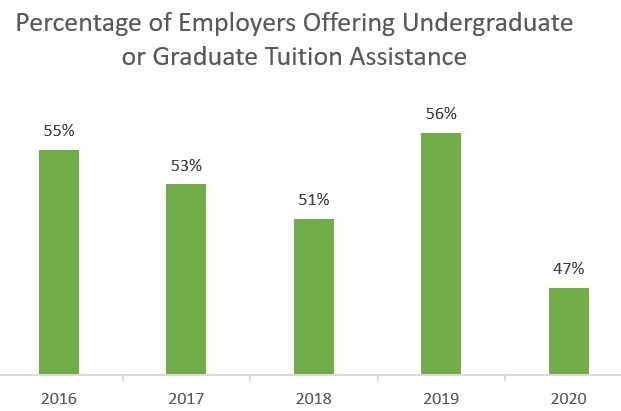Why More Employers Are Leveraging Tuition Assistance to Attract and Retain Employees
Education benefits are now ripe for expansion, many believe

In early September, Amazon announced it was going to cover 100 percent of the cost of college tuition, including books and fees, for its 750,000 hourly employees in the U.S. Over the summer, Target and Walmart made similar announcements, with coverage including both associate and undergraduate degrees.
Amazon, Target and Walmart are following a trail led by Starbucks, which introduced its College Achievement Plan in 2014 and provides all U.S. employees the ability to earn a bachelor's degree tuition-free through Arizona State University's online program. About 20,000 Starbucks workers are currently enrolled in the program, and nearly 7,000 have already earned degrees.
According to a Starbucks spokesperson, the coffee chain "has a long legacy of putting our partners [employees] first. We believe that when we put them first, the result is an elevated Starbucks experience for our stores, customers and communities."
Retailers aren't alone in their tuition reimbursement efforts. Whirlpool Corp. created an educational reimbursement initiative that offers all full-time U.S. employees who have at least one consecutive year of service reimbursement for all associate, undergraduate and graduate degrees, as well as executive MBA programs.
One employee, Maggie Hammaker, started on the Whirlpool assembly line when she was 19 and worked her way up to managing all of the company's classic stand mixer assembly lines. "I don't know that I ever could have gone back to school without [the educational reimbursement program]. From that, [I've] been able to advance my career," she said.
Why Companies Are Investing in Tuition Assistance
It should be no surprise that a growing number of companies are providing educational benefits to employees at a time when they're struggling to find workers to fill vacant positions and retain the workers they have.
"In today's talent market, employees want more than a paycheck. They want rewarding job opportunities, career mobility and new experiences," said Alex Hall, senior director of learning and talent services at Liberty Mutual in Boston.
Hall has personally benefited from the company's tuition reimbursement program, which pays all tuition, book costs and fees upon the completion of any course leading to an undergraduate or graduate degree. He's currently completing his dual M.S. in finance/MBA at Northeastern University, and he's been able to apply what he's learned to his day-to-day work.
"Liberty's tuition reimbursement program has given me the opportunity to pursue my continuing education together in partnership with my manager," he said. "Without this generous benefit, I might not have taken the opportunity to complete this program."
Liberty Mutual encourages employees to consider the three P's—price, pace and program—when weighing whether to return to school. Whichever educational path they choose, Hall said, it should offer value and learning quality, allow employees to balance work and life, and help them achieve their professional goals.
"There is no mandate around what school an employee attends, just that the program is aligned to their career," Hall said.
TEL Education, a learning company in Oklahoma City with 35 employees, offers two kinds of tuition and training benefits for its employees. For those with a minimal college background, the company provides a free associate degree program, which is part of a collaboration with a local university partner. The company also creates an annual personalized training program on LinkedIn Learning to help employees earn additional certifications at no cost, based on each employee's role at the company and their professional goals, said Executive Director Rob Reynolds.
"Beyond salaries and promotions, many employees are realizing that their long-term ceiling for success is dependent, to a large extent, on their educational foundation," he said. "Getting their first college courses or earning a degree can make them eligible for new positions."
TEL Education makes sure the degree and training programs are contextualized within the organization's mission as well as operational needs.
"This ensures that they are prepared for further promotion within the organization and see clear pathways for advancement," Reynolds said, citing the example of two single mothers who lacked the time and money to further their education. But with company help, they enrolled in the free associate degree program and could complete coursework as part of their official responsibilities.
"They are now working toward greater personal and professional success," he said.
The Costs of a Tuition Assistance Program
While Reynolds said TEL Education's cost for the free associate degree is $4,000 per employee, Liberty Mutual, which has 45,000 employees, covers up to $6,000 per year per employee for an undergraduate education and $9,000 per year for graduate studies, reimbursing up to the entire cost of the program, Hall said. The total cost depends on the program that the employee selects and the manager approves, but Liberty Mutual will pay all of the eligible expenses incurred each year.
Under current law, employers can exclude from an employee's taxable income up to $5,250 per year in education assistance at the undergraduate and graduate level.
"Tuition reimbursement is taxable in certain situations, but it depends on job applicability and federal tax guidelines," Hall said.
The Society for Human Resource Management (SHRM) believes employer-provided education assistance plays an important role in workforce development and "has long championed policies that allow employers to offer education assistance programs relevant to the modern workforce," said James Redstone, director of public policy at SHRM.
Both Hall and Reynolds recognize the value that their companies receive by providing employees with continuing education.
"Skill development programs show employees their employers' commitment to job growth and create a culture where employees can feel their purpose, leading to improved collaboration, engagement and retention," Hall said.
Reynolds echoed a similar sentiment. "We think that our approach is optimal for small and medium-sized businesses looking to compete with large companies," he explained. "We offer free education and training that benefits our employees [and] increases their capacity for helping us grow our organization. And all of this [is done] at a relatively low investment."
Kylie Ora Lobell is a freelance writer based in Los Angeles.
Sidebar: A Benefit 'Ripe for Expansion' More employers offered undergraduate or graduate tuition assistance in 2019 than in previous years, according to the Society for Human Resource Management's (SHRM's) 2020 Employee Benefits report, based on responses of 2,504 HR professionals across the U.S. In 2020, however, the percentage of organizations offering undergraduate or graduate tuition assistance—47 percent—was down 9 percentage points, "likely caused by their tight finances, concern about the quality of higher education being provided during the pandemic and reduced employee demand," according to the report. Source: SHRM 2020 Employee Benefits report. Looking ahead, a rebound is expected. "Education benefits are ripe for expansion, as employers could see real advantages in talent acquisition and retention," the report stated. |
[SHRM members-only toolkit: Designing and Managing Educational Assistance Programs]
An organization run by AI is not a futuristic concept. Such technology is already a part of many workplaces and will continue to shape the labor market and HR. Here's how employers and employees can successfully manage generative AI and other AI-powered systems.




